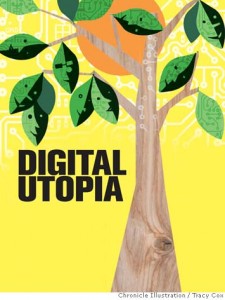 Up until about a month ago I had never considered the actual definition of a web series. Wikipedia defines it simply as, “a series of scripted videos, generally in episodic form.” I thought that I had a pretty good working knowledge of why someone would decide to produce or star in a web series as opposed to entering the television industry. Of course looking back on my initial assumptions, they were all fairly ignorant.
Up until about a month ago I had never considered the actual definition of a web series. Wikipedia defines it simply as, “a series of scripted videos, generally in episodic form.” I thought that I had a pretty good working knowledge of why someone would decide to produce or star in a web series as opposed to entering the television industry. Of course looking back on my initial assumptions, they were all fairly ignorant.
I believed that writers, producers, actors, etc. involved themselves in these projects because they could not make it in Hollywood or did not want to commit to larger endeavors. Even on the most basic level, I was very wrong. A web series takes a lot of time and commitment to be involved in. Also, as I learned from The Meme Team’s presentation, actors and actresses actually go through auditions in order to land a role on web series just as they would for any TV show or movie.
Most importantly, I was overlooking the actual motivation of these creators and contributors because I failed to consider the content that they are ultimately generating. Most web series use their platform to display and acknowledge groups of people who are overlooked on prime time. Beyond acknowledgement, these webisodes usually act in an effort to erase false stereotypes that regular programming may unfairly perpetuate.
The picture shown at the top of this post is of Issa Rae who stars on “The Mis-Adventures of Awkward Black Girl” as the main character, J. The web series revolves around J’s comically frustrating everyday interactions. Blacks are largely underrepresented in television shows, especially in relation to main characters. Sure, there is BET (Black Entertainment Television) but it nowhere near fills the void. By making “Awkward Black Girl” a web series, there was no need to negotiate the content with a network. Instead, it can be played through YouTube and portrayed exactly as how the creators envisioned it.
Another great web series, “The Guild,” follows a group of gamers who interact through their webcams and an online game. In mainstream media, gamers are portrayed as younger in age, predominately male, as well as white and nerdy. The characters in these webisodes vary in age, race, and gender. The character at the forefront, who is also the writer and creator, is a female in her mid-thirties. Some of her fellow players include a mother who I would not describe as nerdy, an older male, and a younger male who is, shockingly, not white. This dynamic more accurately depicts the actual diversity of the gaming world than most mainstream portrayals.
Clearly, there is a lot more to web series than initially meets the eye. Whether or not they could make it on TV is not the question I should have been asking. Instead, the focus should be on why a secondary platform is needed in order to include these underrepresented groups of our population. Fortunately, the Internet has opened up such a sphere. Many web series could make it on network televisions and some have even been picked up to be adapted into shows already. Creators of web series may not even want to be picked up by a network due to the censorship they would have subject their material to; the message could be lost between media. These are the web series that need our attention most: the ones that would not work for TV. The important thing to remember is that all of this content should have a place in our society.






